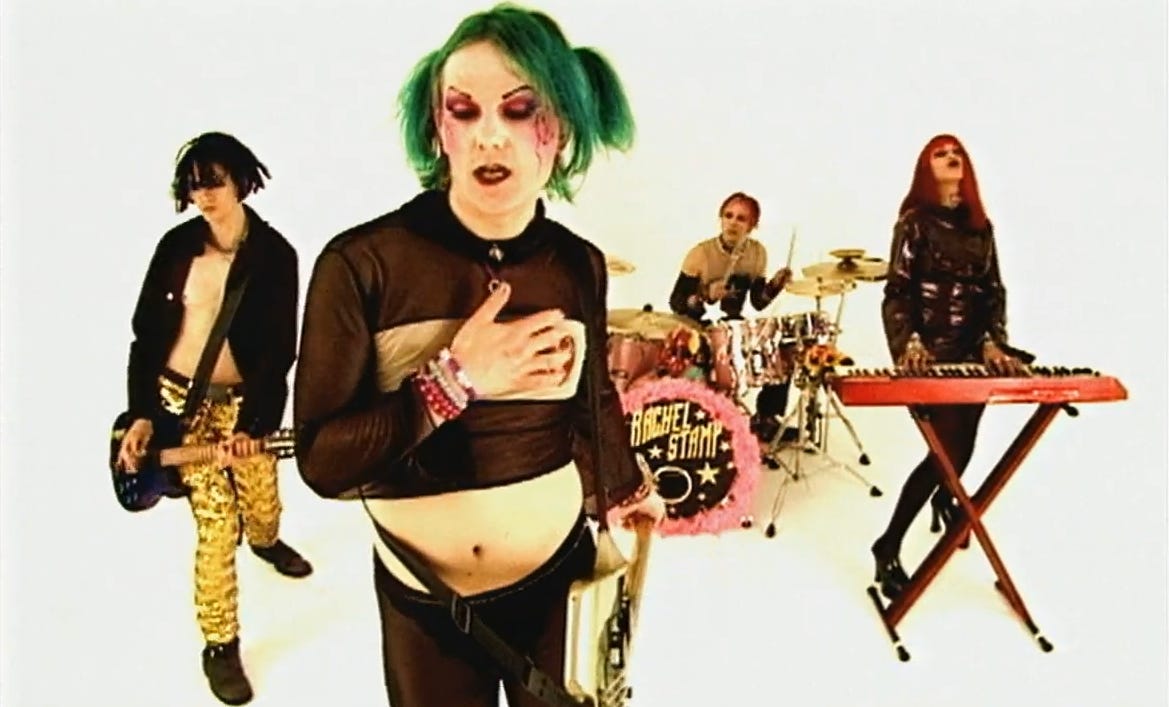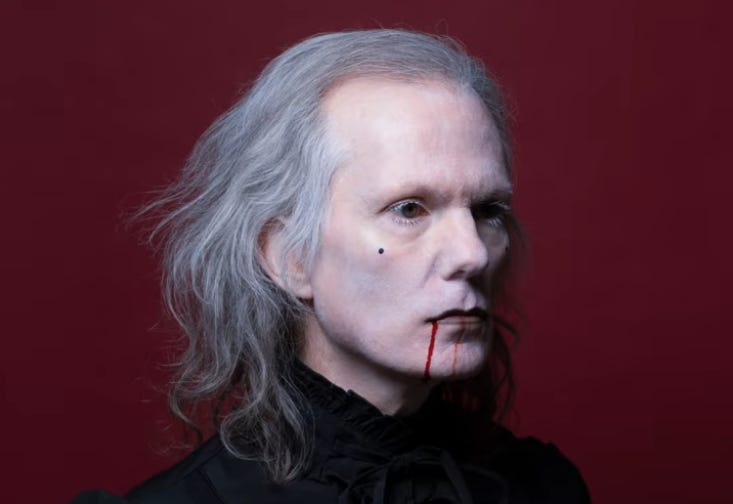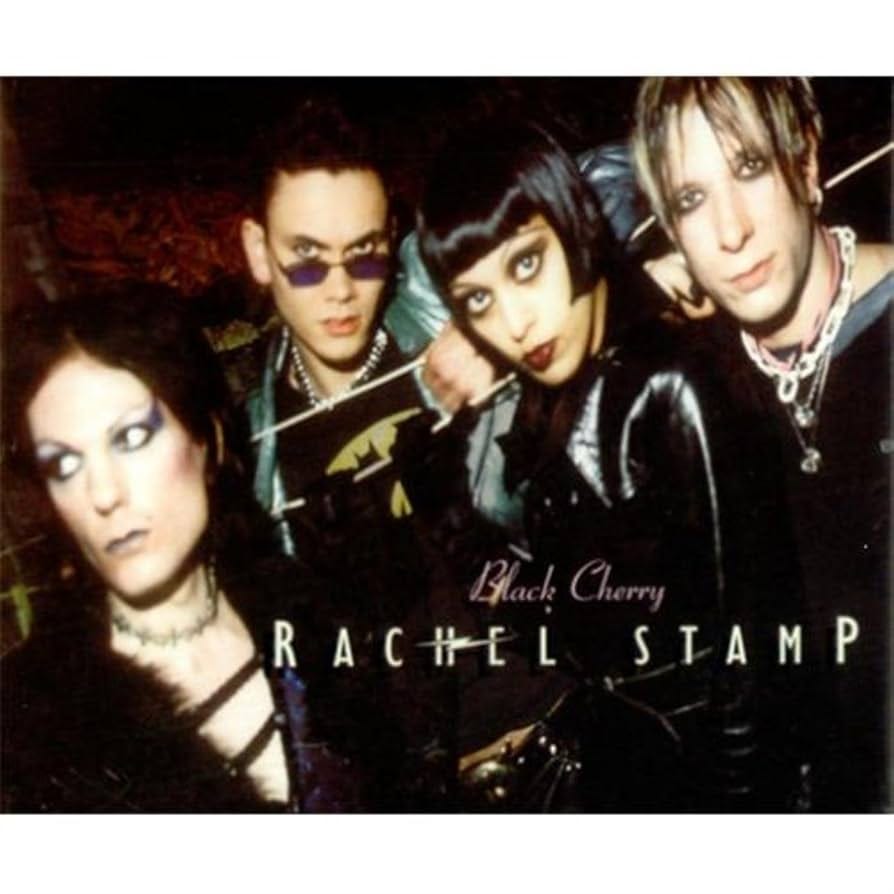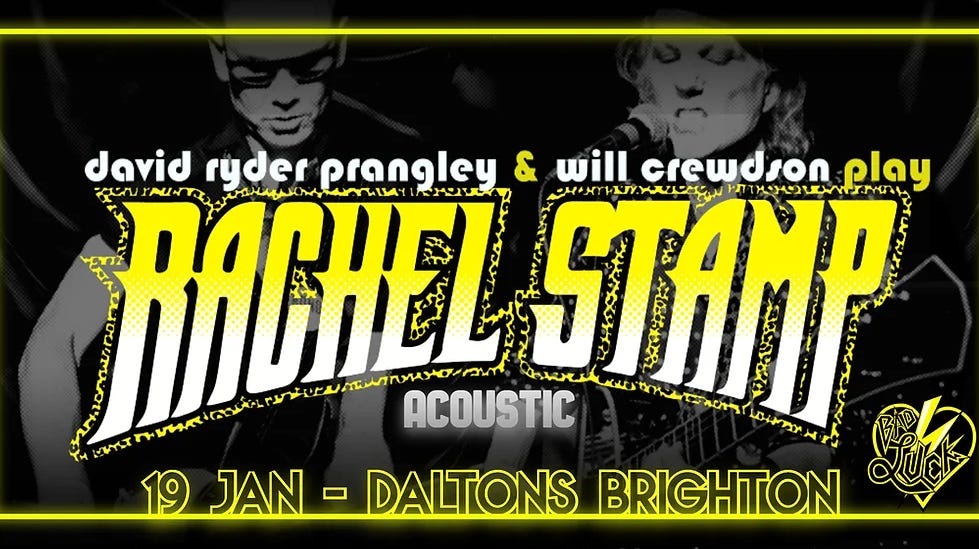Rachel Stamp interview: 'to be a singer in a rock band, people have to be able to draw you.'
David Ryder Prangley on androgyny, influences, and nearly getting electrocuted back in the 90s
Rachel Stamp are a riotous, glam/punk/rock/other band of glorious repute, the first unsigned band to ever sell out the London Astoria (RIP).
Their lead singer, David Ryder Prangley1, and guitarist Will Crewdson are doing an intimate, acoustic set at Daltons by Brighton seafront on Sunday.
I caught up with David2 for a wide-ranging interview, taking in the state of the music industry, the glory / difficulty of having eclectic influences, and the dangers of dressing androgynously in Wales in the mid-1990s.
I also tried to shoehorn in a reference to Brighton, and I think I got away with it.
It was hard to figure out what [Rachel Stamp’s] influences were because there were so many. The music press back in the day stuck you under glam. What did that feel like?
Well, I think when the band started, I was very much about doing something very of the moment.
One of the great things about the nineties was people were throwing together different genres and different influences to come up with something musically new.
We had very eclectic tastes. I didn’t have any money, so I would buy old second hand records.
I was listening to Linda Ronstadt, a band called Missing Persons; I was listening to Sparks a lot. My favourite bands of the time were The Nymphs, Redd Kross.
When I met [Rachel Stamp guitarist] Will Crewdson, we both liked a lot of relatively obscure bands. I was into stuff like Devo, Todd Rundgren. And I loved everything back from Little Richard: all the early rock ‘n’ roll stuff.
We put all this together into a band.
A few people would get confused. With our very early material, people would say, “we don’t really get what this is”. And I’d be like: “I guess it’s like Beck, but it’s a band.”
Not copying him, but in that same spirit of drawing influences from wherever they come.
If we were in a studio, we’d pick up whatever instrument was around and play it, whether it was a traditional electric guitar, or if there were synths we’d plug them in and use them.
At the time people would say there was going to be a glam rock revival, but we weren’t really about a revival of anything.
I mean, I really like T-Rex and Bowie and Kiss - a lot of my favourite musicians were very androgynous, going back to Suzi Quattro and Joan Jett. And Prince.
Visually, [androgyny] was something I’d always done, even as a teenager. I just wore what I liked.
And with the band starting, and being aware we needed to get some attention, we very much amplified all of that.
I always thought: if you’re going to be a singer in a rock band, people have got to be able to draw you, or dress up as you on Halloween.
So that’s when I started dyeing my hair crazy colours, wearing a lot of make-up all the time. Drawing those swirls on my face.
I wanted to create an image to just stand out. So it’s really funny you say about the glam rock thing. I remember, people would say: “so what kind of music are you?”
And of course, you go into this big, artistic description, like “oh, we’re kind of an avant garde, left field….”
And then we turned up for a gig in Hull, and the listings on the board went: “Rachel Stamp: glam rock.”
And I just thought, it’s just what people are going to say.
It was rock music, and I guess it was glam, so…
We never set out to be “a glam rock band”. Anyone who listened to us knew that’s not what the band sounded like.
Your music has always had a very strong visual element to it, and I love this idea of needing to be easy to draw. Did you get people sending you drawings of yourself?
Yeah. That would happen. It was just that need to be recognisable straight away.
Looking at the lineage of identity from the stuff that you did and still do, and the glorious 22 year old queer kids I meet in Brighton now, and I’m interested in the connection there.
I chat to them about their androgyny, and the social expectations around that, it feels almost… innate to them? They’re not tied to a particular tribe, or ethos, or a particular type of music, perhaps. I wonder how that makes you feel as something who was toying with that kind of thing many years ago?
I think it’s really encouraging to see how times have changed. People would literally try and kill me. People would drive cars at me. It was really bad.
You definitely went out thinking: “someone’s going to try and beat me up”. It wasn’t just me, a lot of people will know about that. I grew up in south Wales. Even being a goth, you were dicing with death.
And the basis of that, regardless of whether the person dressing up was gay or not, the reaction was homophobic. And that homophobia, which is based in a hatred of the feminine, is misogynist as well.
It’s really nice that people can do their thing and get a lot less hassle for it, though I’m sure they do still get hassle for it.

I don’t look the same as I did when I was 25, and I don’t want to. I’m not the sort of person who clings to youth.
It was funny though. I was walking out near where I live and there was a teenage girl who basically looked exactly like I did in retrospect. I looked at her and thought: “is she dressed as me, or is she just doing her own thing?”
It’s great. Attitudes have changed significantly since I was in my twenties.
Androgyny is much more acceptable these days. Though I do find it a little bit upsetting that people demand a tick box answer to go along with it, which is a bit strange to me.
Do you know that band Happy Meal Limited?
Yes.
They were recently attacked for stealing from gender-bender [aesthetics]. The whole point of gender-bending is bending the gender, you can’t steal from that.
It doesn’t belong to anyone, it belongs to everyone.
I was just reacting to my environment when I was doing that. I liked the aesthetic, I liked wearing make-up, I liked wearing those clothes. Men’s clothes never really appealed to me.
And I had a friend3 who made clothes for me, so it wasn’t like I was picking men’s or women’s clothes, I was just getting clothes that were specifically for me.
I’m happy that people are embracing androgyny more, but unfortunately people are putting guards up around it, which for me, personally, is missing the point.
You’ve got a gig coming up at Dalton’s in Brighton. Do you have any particular connections with the city, or is it a place you particularly enjoy playing?
I nearly got electrocuted in Brighton during the nineties.
I don’t even think it was a proper venue. We arrived and there wasn’t even a PA system, so we had to run around and find one. And it wasn’t earthed properly, so I’d get electric shocks every time I touched the microphone. And I was playing the bass as well.
The support band, Fifth Amendment, decided they weren’t going to play, because it was too dangerous. And I thought, fuck it, I’ll do it, which was my attitude back then.
So that’s what I remember about Brighton. Hopefully the health and safety standards have improved since.
We shall see.
As you know, our drummer, Robin Guy, passed away last year. Me and Will started the band, and Robin joined a few years later. So me and Will set it up as a fun think to say “oh we’ve been playing together for thirty years or something crazy: let’s do a gig.”
So we did that and… obviously, when Robin passed away, just awful. Just horrible.
I guess this is just a way of us being able to play, and play for the people who want to hear us. It’s a cathartic thing.
And it’s a way of playing the songs and rediscovering them.
It’s quite interesting doing it like this because on record I was playing bass and for the tour I’m playing acoustic, six string guitar. It’s just a different approach to the songs, and it’s quite fun, to see how people react to them. People seem to really enjoy them.
We talk a lot about the origins of the songs, and just talk a load of shit basically, which is what we do, as you’ll discover when you see us.
I’m very excited to see it. And you’ve got some new material coming out too, haven’t you?
Will also does a solo thing called Scant Regard, and at the end we do a couple of Rachel Stamp songs in the style of Scant Regard. And we just decided to record a few of those, so we’ve got an album of that coming out.
Glorious.
It’s more of a Scant Regard record with me as the guest singer! And I’ve been making solo albums for the last six years or so, and am just finishing the third one, which will come out in April or May.
In terms of Rachel Stamp, we’re not really sure what the future holds, just yet.
We shall see.
I wanted to ask you about “the [music] industry” - just trying to get into my head what a young musician’s journey would look like now, compared to someone who started in the eighties or nineties.
The landscape is completely different to what it was. In the 90s, you really needed to have a major record deal just to produce records, because the formats were CD, vinyl and tape. This was pre-mp3. So just to be able to afford to do that you needed some kind of corporation behind you, or just a lot of money yourself.
That was the only way you could do it.
I grew up as a teenager wanting to be a big rock star, and the way you did that was by getting a major record deal. Which Rachel Stamp did, initially, and then that actually turned out to be a bit of a nightmare.
And then we became successful by just putting out our own records. Scraping together enough money to press up records and CDs.
Now, speaking in business terms, it’s direct to customer, which is much better in a lot of ways. Because ultimately if you’re in a band you want a lot of people to get into what you do.
So people can do that, by going out and playing. It’s obviously quicker if you have a record deal, or have a big tour. But you can build it up yourself a lot easier.
The irony is if there’s a band with 500 fans and they bring out t-shirts and digital music, and sell it directly to their fans, you’re going to make a whole lot more money than a band in the 90s on a major record label with 100,000 fans, because the money is going to get to them a lot quicker, without all these huge expenses taken off it.
The music industry has almost become mundane now, whereas it used to be very exciting and glamorous.
The trick of glamour, though, is what it appears to be isn’t what it really is.
It’s much more of a business now, and it’s both good and bad. It’s good for the artist in a lot of ways, but perhaps it’s a bit boring now.
And of course now as well as being a musician, you have to be a salesperson. And some people are just not very good at that. You get some great musicians, but they’re not especially good at selling themselves.
Unfortunately you have a bunch of people lining up to sell you sales methods, which don’t necessarily work.
You’ve just got to work out how to reach the people who will like what you do. Like, there’s no point me being on TikTok.
People on there will be going, who the fuck’s this weird person who looks like an old witch? They’re not going to be going “yeah, great, I’ll get that”.
If I could reach the people that like the older rock bands, or even the slightly younger rock bands, they might like what I do because they like rock music. And at the bottom line what I essentially do is rock ‘n’ roll music.
You’ve probably been asked something like this before, but can you tell me the weirdest situation you’ve found yourself in through making music and performing?
It’s slightly abstract… but it’s quite interesting when you start becoming friends with the sort of people you - or I - used to see on TV as a kid.
One of my friends is called Lana Pellay, who used to go under the name Al-ana Pellay, and did the song Pistol in My Pocket.
So Lana’s one of my best friends, and I was going to see her one day, and I was in the tube. And when I came up, I had an answerphone message, and it was Lana, saying:
“David. When you get to my house, if you see Pete Burns hanging around, don’t let him in the building.”
If you’d have told my 14 year old self I’d have been in this scenario…
Rachel Stamp play Bad Luck Live at Daltons on Sunday 19th January.
…Who Brighton legend Simon Price once described as “putting the glam in Mid-Glamorgan”. Oh Simon.
Rachel van Asch, of Medieaval Baebes.






